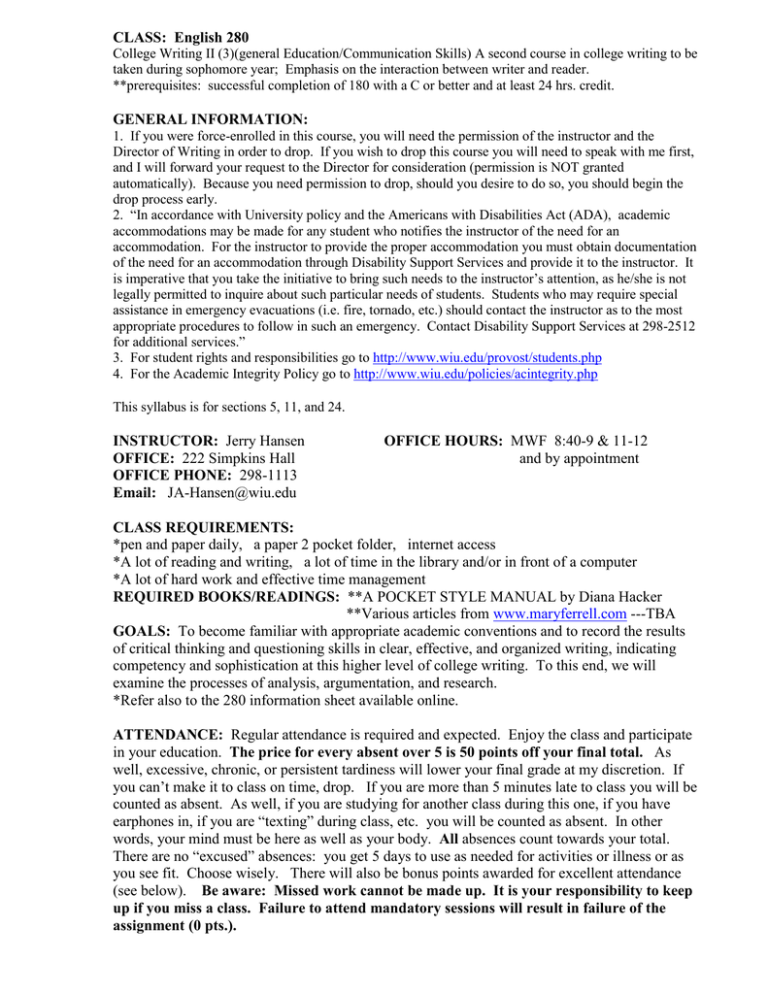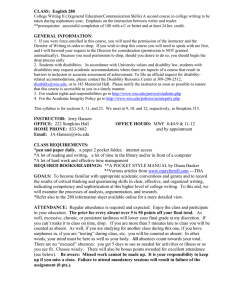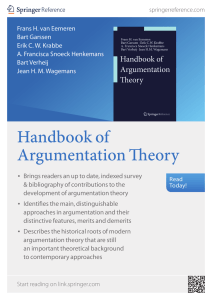CLASS: English 280
advertisement

CLASS: English 280 College Writing II (3)(general Education/Communication Skills) A second course in college writing to be taken during sophomore year; Emphasis on the interaction between writer and reader. **prerequisites: successful completion of 180 with a C or better and at least 24 hrs. credit. GENERAL INFORMATION: 1. If you were force-enrolled in this course, you will need the permission of the instructor and the Director of Writing in order to drop. If you wish to drop this course you will need to speak with me first, and I will forward your request to the Director for consideration (permission is NOT granted automatically). Because you need permission to drop, should you desire to do so, you should begin the drop process early. 2. “In accordance with University policy and the Americans with Disabilities Act (ADA), academic accommodations may be made for any student who notifies the instructor of the need for an accommodation. For the instructor to provide the proper accommodation you must obtain documentation of the need for an accommodation through Disability Support Services and provide it to the instructor. It is imperative that you take the initiative to bring such needs to the instructor’s attention, as he/she is not legally permitted to inquire about such particular needs of students. Students who may require special assistance in emergency evacuations (i.e. fire, tornado, etc.) should contact the instructor as to the most appropriate procedures to follow in such an emergency. Contact Disability Support Services at 298-2512 for additional services.” 3. For student rights and responsibilities go to http://www.wiu.edu/provost/students.php 4. For the Academic Integrity Policy go to http://www.wiu.edu/policies/acintegrity.php This syllabus is for sections 5, 11, and 24. INSTRUCTOR: Jerry Hansen OFFICE: 222 Simpkins Hall OFFICE PHONE: 298-1113 Email: JA-Hansen@wiu.edu OFFICE HOURS: MWF 8:40-9 & 11-12 and by appointment CLASS REQUIREMENTS: *pen and paper daily, a paper 2 pocket folder, internet access *A lot of reading and writing, a lot of time in the library and/or in front of a computer *A lot of hard work and effective time management REQUIRED BOOKS/READINGS: **A POCKET STYLE MANUAL by Diana Hacker **Various articles from www.maryferrell.com ---TBA GOALS: To become familiar with appropriate academic conventions and to record the results of critical thinking and questioning skills in clear, effective, and organized writing, indicating competency and sophistication at this higher level of college writing. To this end, we will examine the processes of analysis, argumentation, and research. *Refer also to the 280 information sheet available online. ATTENDANCE: Regular attendance is required and expected. Enjoy the class and participate in your education. The price for every absent over 5 is 50 points off your final total. As well, excessive, chronic, or persistent tardiness will lower your final grade at my discretion. If you can’t make it to class on time, drop. If you are more than 5 minutes late to class you will be counted as absent. As well, if you are studying for another class during this one, if you have earphones in, if you are “texting” during class, etc. you will be counted as absent. In other words, your mind must be here as well as your body. All absences count towards your total. There are no “excused” absences: you get 5 days to use as needed for activities or illness or as you see fit. Choose wisely. There will also be bonus points awarded for excellent attendance (see below). Be aware: Missed work cannot be made up. It is your responsibility to keep up if you miss a class. Failure to attend mandatory sessions will result in failure of the assignment (0 pts.). PAPERS: You will write two short papers and work on one final research project. I will discuss each of these papers at length at the appropriate time. **Paper 1: Analysis: you will be asked to examine how language works, and the various ways that we, as readers, respond to that language. (approx. 1500 words/5 pages) **Paper 2: Argumentation: you will be presented with an argumentative dilemma and be asked to incorporate the elements of argumentation into examining the choices you make. (approx. 1500 words/5 pages) **Paper 3: Research: you will be asked to incorporate the concepts of analysis and argumentation into an analytical, argumentative research paper. The subject will involve a preapproved topic concerning some aspect of the Kennedy assassination. (approx. 3000words/10 pages) If you don’t think you can be interested in this topic, drop the class and try with someone else. ** We will review the format for acceptable papers in class. **We will discuss grading standards for each paper in class at the appropriate time. Refer to the general grading standards at the end of this syllabus. POLICIES: **Papers failing to meet minimum requirements will fail and receive 0 points. **Failure to follow directions is just that: failure! If you have questions ask them! **I do not accept papers or drafts over email. **I strongly encourage you to show me or the Writing Center drafts of your work at all stages and to revise often. At my discretion, I may require you to attend sessions in the Writing Center. That attendance will then become part of your course grade, and failure to follow through will impact negatively on your final grade. **Once a paper is officially turned in, it cannot be revised any further. You may revise as much as you like before a paper is due. The time to care about your paper’s grade is before you turn it in. **Papers are due at the beginning of class. Do NOT come to class needing to print out your paper. You should be prepared and ready to turn in your work at the start of class. **I do not accept late work, and any paper that shows up mysteriously in my mailbox or on my desk will not be accepted and will receive 0 pts. **You must turn in all 3 papers on time. Failure to turn in any one of the three major papers will likely result in failing the course. **If you are caught plagiarizing, you will fail the course and be reported to CAGAS for adjudication of your case. **TURN YOUR CELL PHONE TO “QUIET MODE” DURING CLASS!!! **It will be very important to pay attention in class. Ask questions if you are unsure. **Professional, ethical, and respectful behavior is required. You will be required to leave if you exhibit disruptive behavior. Let’s treat each other with dignity and respect. GRADES: Your final grade will break down like this: assignments pts. % Paper 1 100 10% The grading scale: Paper 2 100 10% A= 946-1000pts. C+=765-799 Quizzes 200 20% A-=900-945 C= 735-764 Participation/classwork 100 10% B+=865-899 note: below 735 pts. Research Project 400 40% B= 835-864 will result in a U or F: Final Exam 100 10% B-= 800-834 generally, below 700=F Totals: 1000 100% If you can’t do the math, see me for help figuring it out. Don’t be confused about where you stand in the class. Feel free to see me any time to discuss your progress. SOME CLASSIC WAYS TO FAIL: 1. Do not come to class. (Why most students do poorly). 2. Do not turn in any work or fail to follow directions on the work you do submit. 3. Sleep through every class, text, or read the paper instead of paying attention. 4. View your teacher as the “enemy” instead of as a colleague who can help you. 5. Combine any of the above, and then come see me the last week of school to tell me how unfair I’ve been to you and that your problems are all my fault. SOME CLASSIC WAYS TO PASS: 1. Come to class. 2. Turn in QUALITY work, not a typed first draft. 3. Be attentive and involved in class. 4. View your teacher as an ally and come for help. 5. Have high standards of excellence, accept responsibility, and work hard. IMPORTANT DATES: tentative schedule (Refer also to the daily schedule) Jan. Feb. Feb. Mar. Mar. Mar. Mar. April May 26M 2M 11W 11W 14-22 23M 27M 29W 11-15 Open registration ends Last day of restricted schedule changes Paper 1 (analysis) due Paper 2 (argumentation) due Spring Break Discussion of JFK readings and related topics begins Last day to accept research topic proposals Research projects Due Final Exam Week PLEASE NOTE: This syllabus is subject to change according to need as I see it. By remaining enrolled in this class, you agree to abide by the terms outlined here and in the information sheet. If you have a problem with any of the topics, policies, or practices in this syllabus, or if you are not prepared and eager to work hard, you should drop the class. This class is challenging. If you “expect” an A just for showing up, drop now! Ask questions. Work hard. Have dignity. Attendance bonus/penalty points: # absents Points 0 +15 1 +10 2 +05 3, 4, 5 no bonus/no penalty 6 -50 7 -100 8 -150 9 -200 10 -250 11 or more = impossible to pass Obviously, the more classes you miss, the more difficult it becomes to pass, not withstanding the course material and instruction you will also miss. GRADING STANDARDS An “A” paper will have all of the following characteristics, meet all criteria, and go beyond the basic standards stated here. A “B” paper will have some of the characteristics of an “A” paper, but will be lacking in some of these areas. A “C” paper will have some of the characteristics of an “A” paper, but will be lacking in several of these areas. **It has a central, focused, controlling, main idea stated clearly and strongly. That idea demonstrates substantial, perceptive, and careful thought. This occurs in a fully developed and thought provoking introduction. **It supports that main idea by means of coherent, well developed paragraphs. Those paragraphs contain and explain convincing and appropriate evidence. Those paragraphs develop ideas fully. When appropriate it uses correct citation and documentation. **The organizational structure recognizes the requirements of the kind of paper being written. Ideas are organized and unified in a logical fashion. They flow well together by use of sophisticated transitions. It finishes with a forceful, well developed conclusion. **The language of the paper selects words that display a clarity of thought. It avoids clichés. It maintains an appropriate tone for its audience. The vocabulary demonstrates careful consideration of word choice. **It demonstrates a mastery of the rules of grammar, punctuation, and spelling. It uses idiom correctly. The construction of sentences displays a variety of rhetorically appropriate forms. **It fulfills all formal requirements of the particular assignment. ****What are some common errors and their consequences? The best a paper can get is a “C” if it has the following kinds of errors: Errors in basic grammar such as subject/verb agreement errors, run-ons, fragments, etc. Punctuation errors Spelling errors Undeveloped introductions or conclusions “Empty” paragraphs: lots of words but no substance Misuse of source material Errors in documentation One or two sentence paragraphs Lack of organization Undeveloped or unexplained ideas Unfulfilled formal requirements A paper with more than one or two of these kinds of errors, or an over-abundance of one of these errors, will likely tip the paper down into the “U” or “F” range. Tentative Schedule for Spring 2015 The analysis section of the course: Jan. 21W Introductory Comments and Syllabus 23F Communication and Language 26M Assigning paper #1 28W Samples and practice: “The Death of the Ball Turret Gunner” 30F Samples and practice: “Summers at Faroe” Feb 2M Group discussions of paper topics 4W A look at sample papers: “The Afterthought”/ Review of academic conventions 6F In class work day 9M 11W 13F Paper #1 peer review day (Mandatory) Paper #1 DUE No Class The analysis and argumentation section of the course: 16M Introduction to argumentation 18W An exercise in common sense, knowledge, logic, and organization 20F Assigning Paper 2 23M 25W 27F Logic and logical fallacies Quiz: Logic, logical fallacies, concepts from the first 5 weeks Work day Mar 2M A brief jump forward to discuss the research paper, proposal, and readings Your reading assignment: www.maryferrell.org 1963 JFK Assassination: The “Starting Points” essay 4W Group discussions of argument paper topics 6F In class work day 9M 11W 13F Paper #2 peer review day (Mandatory) Paper #2 DUE Quiz: The “Starting Points” essay (obviously, have your readings done by this date)!! Spring Break March 14-22 The analysis, argumentation, and research section of the course; the research focus for this section will be the JFK assassination: March April 23M 25W 27F Background information: Medical Evidence Finish medical evidence discussion/ Topic Proposals Due 30M QUIZ: JFK background and medical evidence 1W Research Handouts 3F Tampering with Evidence? 6M No Class: Research/ conference day 8W In class work day: bring in what you’ve got so far, ask questions, get organized 10F Oswald Guilty 13M Oswald Innocent 15W QUIZ: Oswald 17F Work Day 20M In class work day: rough draft exchange (mandatory) 22W The Warren Commission was Right 24F QUIZ: The Warren Commission May 27M Picture Day 29W Research Papers/folders Due 1F No Class 4M Final Exam Study Guide 6W No class: Study for Finals 8F Optional Review Day….. Ask Questions May 11-15 FINAL EXAM WEEK: Section 05- Wed. May 13th 8:00 AM Section 11- Mon. May 11th 10:00 AM Section 24- Mon. May 11th 1:00 PM You must come to your section’s assigned exam time.





